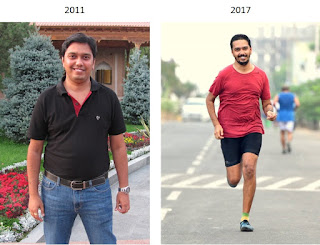Starting Too Fast in a Race:
What is too fast?
Too fast is when you start your race much faster than the overall race pace. So for example if your average pace required for each km according to your target is 7.00 per KM and if you start your race by running the first 2 kms at say 6.15 pace, {which is quite possible} you may be in for a rude shock at the mid point or near end of the race. Your pace will suddenly drop and that will mean that you may land up slower than your desired time. This has been proven in various races and by studying a lot of runners over the last few years.Why does it happen that we tend to start fast?
There are multiple reasons behind this:1. Surge of adrenaline – standing at the start line of one of Asia’s largest Running event will surely have an impact on the excitement levels. If anyone of you uses HRM, you should check your Heart Rate even before you start your race just when you are at the start line and you will be surprised. This is due to adrenaline.
2. Good Taper – If you have tapered well, in that case your
legs will feel fresh and you may tend to feel very comfortable at a faster pace
as well and you may feel you can push this pace for the entire distance, but it
may not happen.
3. Everyone will run fast – You will see at the beginning of
the race almost everyone will start fast and overtake you. This may lead you to
think that you are going slow and you will tend to push yourself. You will be taken over by an optical illusion seeing that everyone is overtaking you and you will tend to run faster than required.
4. Big race excitement – you have trained very hard for this
one race and hence you would want to give your best leading you to start fast
What happens inside the body when you start too fast?
There is a lot of merit in running a race at even splits or negative splits. The reason behind this is that for a long distance race your body derives energy from the Glycogen reserves. If you run at a much faster pace than your optimum pace, then the glycogen reserves deplete way too faster leaving you tired and drained out in middle of the race or near end of the race. Glycogen is very very important for a good race and hence letting the body use it judiciously is important.So what should be your pace for the first one or two kms?
Ideally it should be same as your overall race pace or even 5-10 secs slower is alright. For eg for my bus (I am pacing the 2.10 Half Marathon bus for TMM 2019) the average pace required is 6.10 but the first two kms plan is to go at 6.20 and 6.15 each.How do I do that?
1. Obvious – Start slow. Even if you feel comfortable and that you can push through, hold on to that feeling and don’t step on the paddle.
2. Start at race pace – this is very difficult to do if you
are not used to wearing a tracking device. Also at times the tracking device
may not be accurate at the beginning of the race.
3. Ignore what is happening around you – Stay focused on
your race. You are not competing with anyone. Your competition is with
yourself. So if someone is overtaking you, let it be. IGNORE. There is a high
likelihood that you may see the same person walking at a much slower pace after
a few KMs.
4. Join a pacer bus – By joining this group you have already
made a good move. Pacers are experienced runners and are aware of this very
thing and can alter their pace to what is optimum. Hence the most wise decision
is to stick to a pacer group. It will be too unlucky however if the pacer
starts fast.





Very very good and useful writeup dear...
ReplyDeleteThank you
DeleteGood information dev.thanks for sharing
DeleteVery well explained Dev.
ReplyDeleteThabk you
DeleteNice read, especially at this point of time. Remembered your training plan which clearly says slow pace at first 3 km
ReplyDeleteVery well illustrated insight Dev. This will definitely help all the runners to reach their targeted goal in time. Thanks :-)
ReplyDeleteClarity of thoughts in simple words !!!
ReplyDeleteNicely written, good insights, well timed.. Thnx
ReplyDeleteIt is really a timed advice. Enthusiasm in race be avoided. It is the message that you are running against yourself and not against any runner. Hats off to Shri Dev-sir.
ReplyDelete